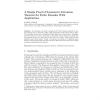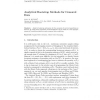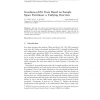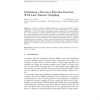JAMDS
2002
13 years 3 months ago
2002
Under traditional cointegration tests, some eligible I(1) time series systems Xt, that are not cointegrated over a given time period, say (0, T1], sometimes test as cointegrated ov...
JAMDS
2002
13 years 3 months ago
2002
Abstract. In this paper we provide a simple proof of the extension theorem for partial orderings due to Suzumura [1983] when the domain of the partial order is finite. The extensio...
JAMDS
2002
13 years 3 months ago
2002
Analytic bootstrap estimators for the moments of survival quantities are derived. By using these expressions recommendations can be made as to the appropriateness of bootstrap esti...
JAMDS
2002
13 years 3 months ago
2002
Abstract. Recently the authors have proposed tests for the one-sample and the ksample problem, and a test for independence. All three tests are based on sample space partitions, bu...
JAMDS
2002
13 years 3 months ago
2002
This paper draws attention to the risk of rounding error in the numerical evaluation of steady-state probabilities for the M/M family of queues. A method for avoiding the risk is p...
JAMDS
2002
13 years 3 months ago
2002
We propose a new heuristic for the solution of the quadratic assignment problem. The heuristic combines ideas from tabu search and genetic algorithms. Run times are very short comp...
JAMDS
2002
13 years 3 months ago
2002
Abstract. A resource selection probability function is a function that gives the probability that a resource unit (e.g., a plot of land) that is described by a set of habitat varia...
JAMDS
2002
13 years 3 months ago
2002
Abstract. An efficient optimum solution is presented for a real-life employee daysoff scheduling problem with a three-week cycle. Over a given work cycle, each worker is given 14 s...




